If you’re not tracking your customers’ data, you’re missing out on golden opportunities to surprise them with impeccable service. CRMs for service businesses make sure that teams never lose sight of their customers’ needs by placing critical data front and center so that they can work proactively and create positive customer experiences.
In this article, we’ll give you an overview of why CRMs are essential for service-based businesses and what to look for in a solution. We’ll also introduce you to some of the top CRMs for service businesses and take a look at how monday CRM’s AI solution is a game-changer for service teams.
Try monday CRMWhat is a CRM for service businesses?
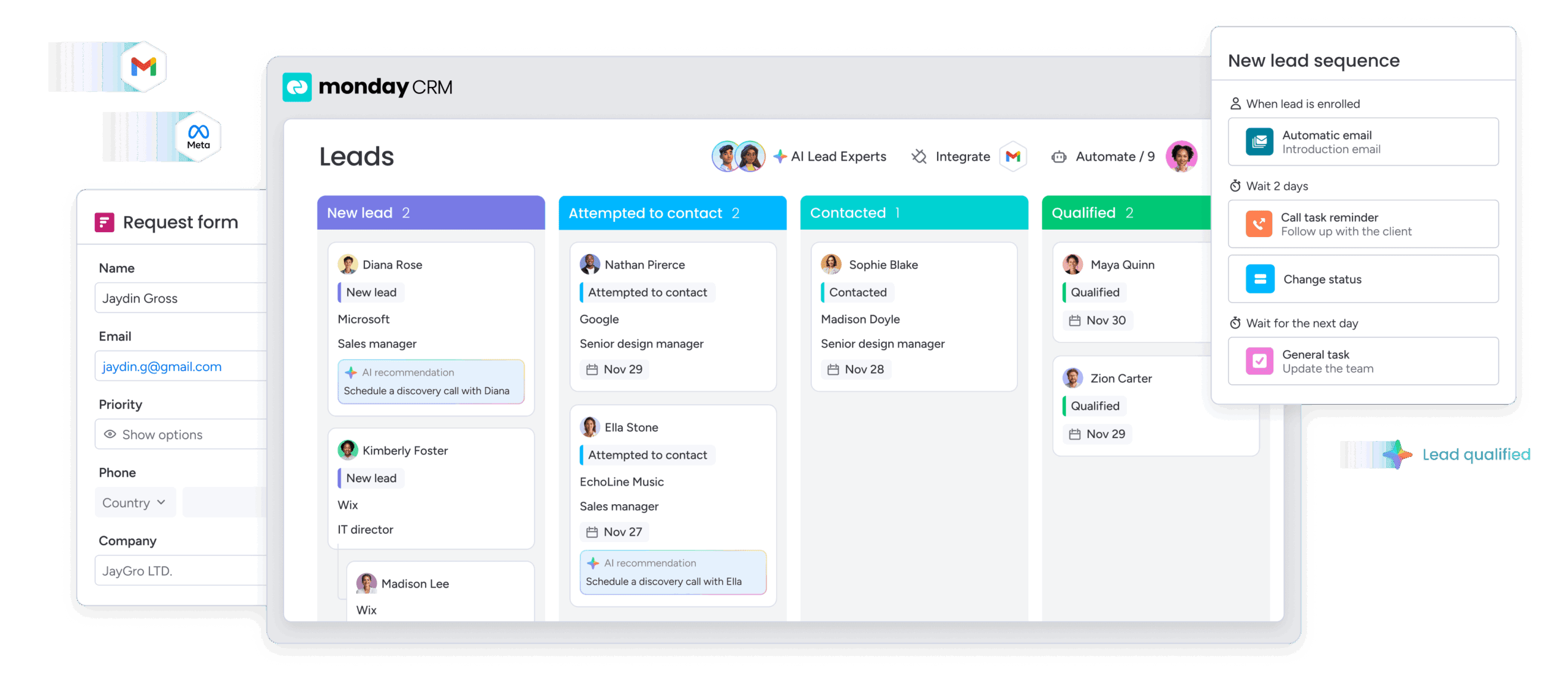
A customer relationship management platform, or CRM, for the service industry helps companies offer better support to their customers. Service businesses typically have tons of incoming requests, communications, and customer tasks, and CRMs allow teams to keep everything streamlined and concentrated in one place.
With a CRM for a service business, sales teams can also learn more about their customers by looking at data gathered from previous interactions, purchase history, and personal preferences. These insights can improve the services a business offers by including more targeted and personalized solutions. Service CRMs also centralize job histories, service records, and customer communications so teams can resolve issues faster and deliver consistent on-site and post-service experiences.
Why do service businesses need a dedicated CRM in 2026?
If you’re a service business and you’re already using software like a ticketing system or communication platforms, you may be wondering whether adding another platform like a CRM to the mix is only going to complicate things. The reality is quite the opposite.
CRMs allow you to sync data from all your apps into one platform so you can seamlessly collect data from every touchpoint and visualize insights in real-time. A CRM for service businesses allows teams to improve workflow efficiency and increase customer satisfaction, making it not only a “nice-to-have” tool, but one of the most critical platforms to keep teams aligned and productive.
At a practical level, a modern CRM directly impacts how service teams operate day to day:
- More consistent customer experiences across service visits: Centralizing and managing your customer data will allow your team to provide personalized and timely service, leading to more satisfaction and customer loyalty.
- Efficient appointment management: Automate appointment reminders to make sure coordination is seamless between service teams and customers.
- Faster issue resolution with historical customer data: Access every customer’s entire history with your company, from messages to purchases, making it easier to resolve issues right away.
- Streamlined communication: Integrated communication tools for emailing, sending text messages, and call tracking make it simple to respond to customer inquiries right away.
- Better visibility into service performance: Real-time reports help teams track service levels, workload, and customer trends so managers can make faster, more informed decisions.
- Clear handoffs between office staff and field teams: When every team member can access the same customer data, they can collaborate better and offer a more consistent service experience.
What CRM features do you need for a service business?
When shopping around for the right CRM for a service business, you’ll notice that most platforms come packed with features. However, service teams don’t benefit from feature overload. Instead, the right CRM should support the realities of service work — managing ongoing client relationships, coordinating jobs, and keeping communication flowing between office staff and field teams.
At a baseline, service businesses should look for CRM features that help centralize customer data, reduce manual follow-ups, and keep work moving across the entire service lifecycle:
- Contact and service history management: Keep customer details, service history, preferences, and notes from previous interactions in one place so teams can deliver consistent, informed service.
- Task and job tracking: Assign and track tasks related to service delivery so accountability is clear across teams and jobs don’t stall.
- Integrated communication: Capture emails, SMS messages, and call logs directly in the CRM to maintain a complete record of customer interactions.
- Custom automations: Automate follow-ups and reminders so teams don’t miss appointments, responses, or next steps.
- AI-powered workflows: Use AI to prioritize urgent requests, surface risks, and automate routine actions without increasing administrative work.
- Analytics and reporting: Generate insights into service performance, team workload, and customer trends to support better decision-making.
- App integrations: Sync scheduling, accounting, and communication tools to avoid siloed data and constant context switching.
Key features for CRM for field service
Service teams that work in the field require additional CRM capabilities to manage on-site workflows efficiently. Beyond general CRM functionality, field service teams need visibility into where each job stands and the ability to update information in real time.
Typical pipeline stages for service and field teams include:
- Lead intake and qualification
- On-site inspection or estimate
- Scheduling and technician dispatch
- Job completion and documentation
- Invoicing and post-service follow-up
A CRM built for field service should make it easy to manage these stages without relying on manual tracking or disconnected tools. Mobile access allows technicians to view schedules, update job statuses, capture photos, and add notes directly from the field. During service visits, teams should be able to record inspections, collect customer signatures, and document completed work digitally to eliminate paperwork.
Automated scheduling and dispatching help assign jobs based on location, skills, availability, and priority, reducing delays and improving response times. After jobs are completed, automated invoicing and post-service follow-ups ensure customers are billed promptly and satisfaction is addressed while the service experience is still fresh. For added convenience, self-service portals can allow customers to schedule appointments and view availability without back-and-forth communication.
The 6 best CRMs for service businesses
Selecting the right CRM software for your service business isn’t a small choice. Your CRM will become a hub for all your clients’ needs, from service to inquiries and even upselling them or introducing new products. That’s why it’s so important to choose the right CRM for your business from the start.
The table below gives you a quick side-by-side comparison of each CRM, but to get into more detail on each one, keep on reading below.
| Platform | Use case | Starting price | Free trial | User rating |
|---|---|---|---|---|
| monday CRM | Flexible AI CRM that improves service levels | 14 days | $12/seat/month | 8.1/10 (TrustRadius) |
| HubSpot Smart CRM | Robust CRM with great marketing and sales tools | Free plan | $45/seat/month | 8.4/10 (TrustRadius) |
| Zoho CRM | User-friendly platform for building lasting customer relationships | 15 days | $14/user/month | 8.6/10 (TrustRadius) |
| Salesforce Sales Cloud | Enterprise-level service CRM with tons of integrations | 30 days | $25/user/month | 8.8/10 (TrustRadius) |
| Creatio CRM | Low-code CRM platform to customize workflows | Free demo | $25/user/month | 9.1/10 (TrustRadius) |
| SAP Sales Cloud | Enterprises with complex service operations already in the SAP ecosystem | Free demo | Upon request | 8.5/10 (TrustRadius) |
1. monday CRM
Use case: Flexible AI CRM that improves service levels

As part of the monday.com Work OS, monday CRM offers an all-in-one platform that makes it easy for service teams to grow each customer relationship. Driven by AI, the platform is packed with features to create smart service workflows to improve productivity and customer satisfaction. The software is also incredibly intuitive and easy to use, making it suitable for a range of industries and company sizes. This makes monday CRM especially well-suited for service businesses managing recurring jobs, field teams, and complex client relationships.
Key features
- AI-powered insights and dashboards: Forecast technician capacity, identify service bottlenecks, and spot at-risk accounts before issues escalate.
- Digital AI assistant: With monday sidekick built into the CRM, teams can customize boards, get real-time insights, or create workflow automations just by chatting.
- Custom AI automations: With monday CRM’s AI blocks, you can implement instant automations, like sentiment detection and auto-summarization for long email chains.
Pricing
- Free 14-day trial
- Plans starting from $12/seat/month
Learn more about monday CRM plans and pricing.
What users are saying
Trustradius rating: 8.1/10
“We use monday CRM for our entire central work flow – all processes, from internal to customer related tasks. Our entire implementation process for clients runs through monday CRM. We use monday CRM to communicate with our team, it helps with efficiency and visibility of workload of the teams and creates a central place where everyone knows what is going on in the business at any time.” — Verified user
Try monday CRM2. HubSpot Smart CRM
Use case: Robust CRM with great marketing and sales tools
HubSpot Smart CRM is designed to be a source of customer intelligence, combining sales and marketing workflows in one platform. The interface is simple to use and easily integrates with other HubSpot products. For service businesses, HubSpot CRM offers different tools to help teams attract, engage, and delight at different stages of the customer journey.
Key features
- AI data agent: Ask your agent questions about customers to get quick answers from your call history, emails, documents, or the web.
- AI overviews: AI can surface important data like potential issues or missing data, so you can improve service levels proactively.
- Meeting scheduler: Let your customers automatically schedule meetings without back-and-forth emails.
Pricing
- Free plan available with basic tools
- Plans starting from $45/seat/month
What users are saying
Trustradius rating: 8.4/10
“I use HubSpot CRM to keep all our customer information and data in one place, which makes it easier for sales and marketing teams to track leads, follow up, and manage the pipeline. My team connected HubSpot with our billing, support, and reporting systems so everyone works with the same, real-time data. This helps us avoid scattered information, manual tracking, and missed follow-ups. I also use the insights from HubSpot to guide decisions on customer needs and future product improvements.” — Avesh Kumar
3. Zoho CRM
Use case: User-friendly platform for building lasting customer relationships
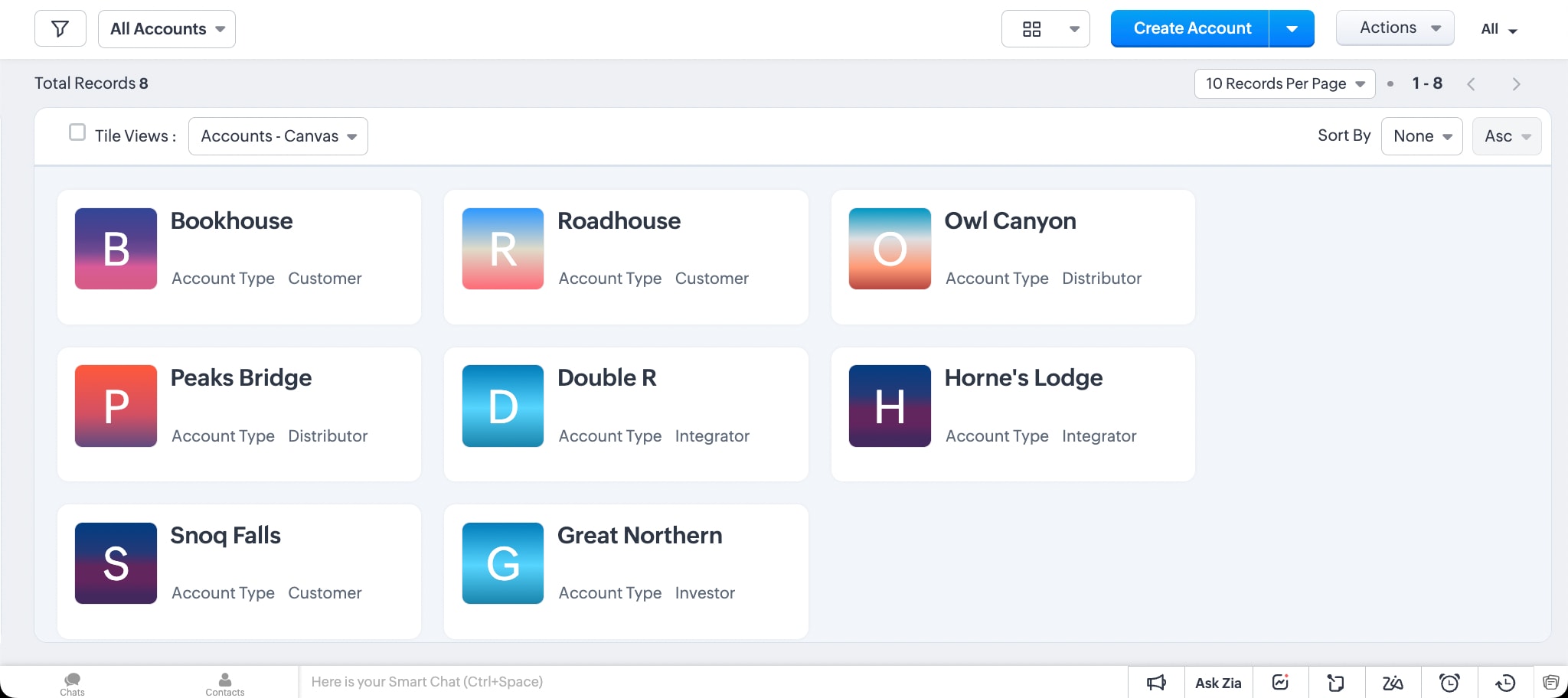
Zoho CRM, part of the Zoho suite of products, is a good option for service-based businesses that want to build a memorable customer experience. With Zoho CRM, teams get a 360-degree view of their customers while getting a fully customizable CRM software that can fit existing workflows.
Key features
- Zia AI agents: Zoho’s AI agents can help service teams create meetings, update statuses, summarize customer interactions, and schedule post-service follow-ups.
- AI predictions: Identify future resource and service needs as well as customer churn to stay one step ahead and intervene with solutions.
- Unify customer data: Instantly merge and access customer data from multiple channels, whether it’s email, live chat, phone, or social media.
Pricing
- Free 15-day trial
- Plans starting from $14/user/month
What users are saying
Trustradius rating: 8.6/10
“We have been using Zoho CRM for over a year now. It is used for customer/sales-related information. It has excellent automation tools built in and does a great job generating reports of our users’ activities for us to review. It also integrates into our website and can import data from our primary contact form. They also have a great support team.” — Verified user
4. Salesforce Sales Cloud
Use case: Enterprise-level service CRM with tons of integrations
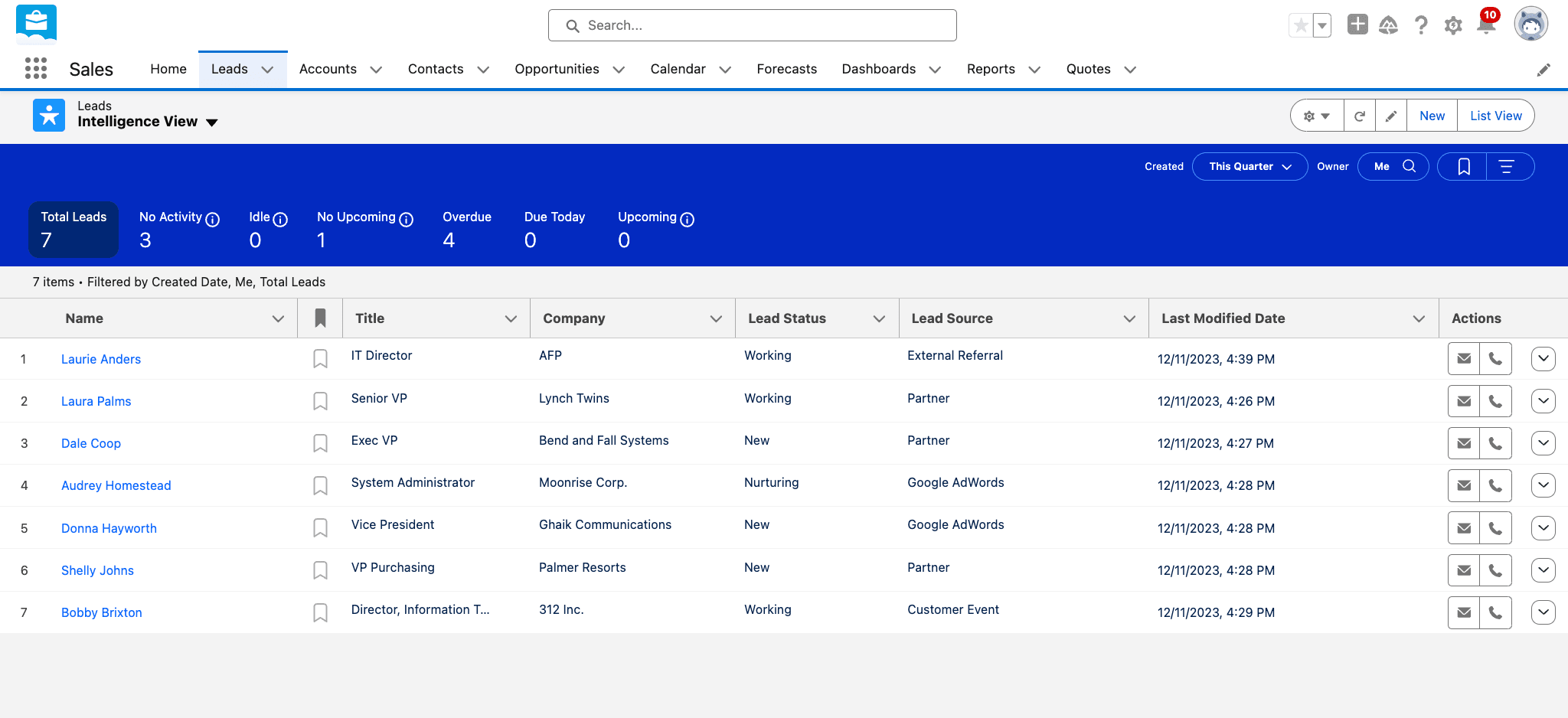
Salesforce Sales Cloud is a CRM that makes it easy to manage customer relationships and services. The platform also uses advanced AI to drive business growth and facilitate simple service workflows. Salesforce Sales Cloud is scalable and ideal for larger teams with complex customer relationship management needs.
Key features
- Einstein AI: Customize work and marketing automation tasks, apps, and prompts fully supported by Salesforce’s Einstein AI and free up time with autonomous actions.
- Hundreds of integrations: Salesforce offers app integrations with hundreds of different work tools, making it simple to sync data between your existing platforms.
- Autonomous AI agents: By integrating Agentforce, service teams can deploy digital AI agents that can handle customer interactions in context.
Pricing
- Free 30-day trial
- Plans starting from $25/user/month
What users are saying
Trustradius rating: 8.8/10
“Salesforce Sales Cloud is a modern day customer relationship management software. The product allows us to improve marketing and increase customer loyalty. It is well suited in activity and workflow management. Use of the product in our organisation has enabled us to navigate through modern selling and automate sales processes from marketing campaign management to lead nurturing and scoring.” — Mipim Wangechi
5. Creatio CRM
Use case: Low-code CRM platform to customize workflows
Creatio is a low-code CRM platform, which means service businesses can create their own tailored workflows with minimal technical skills. Combining CRM functionality, agentic AI, and business and sales process management, Creatio CRM helps service teams deliver a seamless experience.
Key features
- Generative AI tools: Creatio CRM’s AI models help teams route and prioritize cases and create lists for customer segmentation without manual intervention.
- Contact center: Intelligence queue management and case distribution functions help sort customers to the right sales rep for quicker response and resolution times.
- AI agents: Create autonomous AI agents that respond to natural language to help your service teams gather insights, automate workflows, and extract key data from cases.
Pricing
- Free demo available
- Plans starting from $25/user/month
What users are saying
Trustradius rating: 9.1/10
“In our organization, Creatio serves as a versatile information hub, it allows us to centralize and facilitate communication across various departments and business processes. This centralization allows us to create a better ‘top-down-view’ for our management teams in addition to standardizing processes across our company.” — Justin Sowell
6. SAP Sales Cloud
Use case: Enterprises with complex service operations already in the SAP ecosystem
SAP Sales Cloud is a comprehensive enterprise solution designed for organizations with sophisticated service management requirements. It provides deep integrations with existing SAP systems while delivering powerful tools and AI capabilities for managing customer relationships.
Key features
- AI copilot recommendations: SAP’s AI copilot, Joule, can analyze customer data to suggest optimal service approaches and predict customer needs before they arise.
- Business AI agents: Integrated AI agents help teams craft campaigns, personalize interactions, and offer self-service portals to customers to get answers sooner.
- Advanced AI analytics and reporting: Generate AI-led insights into service performance, customer satisfaction metrics, and operational efficiency to support decision-making.
Pricing
- Free demo and product tours available
- Pricing available upon request
What users are saying
Trustradius rating: 8.5/10
“At our company, we use SAP Sales Cloud to track the entire sales pipeline. For example, it provides a single place to store activity about our sales process and who we engage with, streamlines the quote creation and approval process which accelerates deal cycles. We were able to achieve better collaboration between sales, marketing, product management, and customer support.” — Satyam Malik
How to choose the best CRM for small service-based businesses
Selecting the right CRM for a small service-based business might seem tricky, but if you break it down by focusing on your non-negotiables and the features that really matter, you’ll have an easier time making a decision. For small service-based businesses in particular, the right CRM should reduce administrative work without requiring dedicated IT resources.
If you’re stuck between a few good CRM choices, here are some questions to ask yourself to pick the best platform for your organization:
- Will this CRM be able to scale easily as your team or business grows?
- Can you customize the platform to fit your existing workflows?
- Does the CRM you’re considering integrate with your existing work apps?
- Will all of your team members find it easy to use and implement?
- Does the pricing model scale affordably, or will costs increase significantly?
- Are there any hidden fees for integrations, storage, or additional features or users that aren’t included in the base price?
After narrowing down your options, continue by testing out 1 or 2 CRMs with free trials. A free trial is a great way to test out a few of your core service workflows to get a better idea of how the software will fit into your team and current tech stack.
Maximize efficiency with monday CRM for service businesses
When evaluating CRM options for service teams, efficiency matters as much as flexibility. monday CRM centralizes job data, customer communications, and service workflows in one platform, helping teams reduce manual work while maintaining consistent service quality as operations scale.
We’ve already looked at a few of the features that make monday CRM stand out for service-based businesses, but let’s look at a few more functionalities that make it the most suitable option for your service team:
AI and automation features for faster dispatch
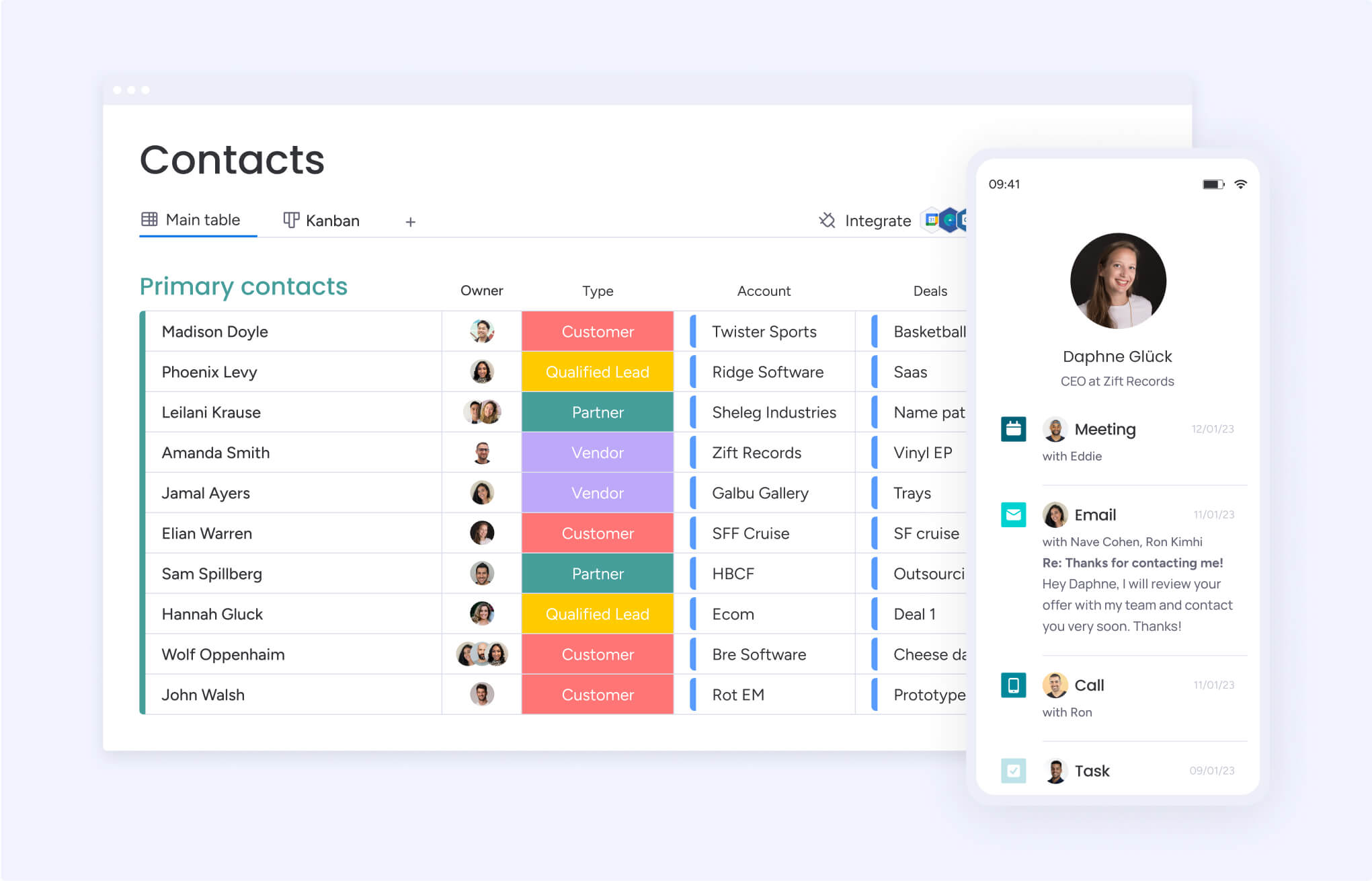
Teams can update customer records, job statuses, and notes directly from the mobile app while on-site, ensuring information stays accurate and accessible in real time. AI-powered email tools and smart templates streamline appointment confirmations, service updates, and post-visit follow-ups, so communication stays consistent without added effort. Post-service invoicing and payment reminders can also be automated, helping teams shorten billing cycles and avoid delays caused by manual processes.
For service businesses running follow-up or retention campaigns, monday campaigns extends monday CRM by letting teams launch AI-powered email campaigns directly from CRM data — such as post-service check-ins, seasonal promotions, or reactivation messages — without switching tools.
Reporting, AI summaries, and predictive resource mapping
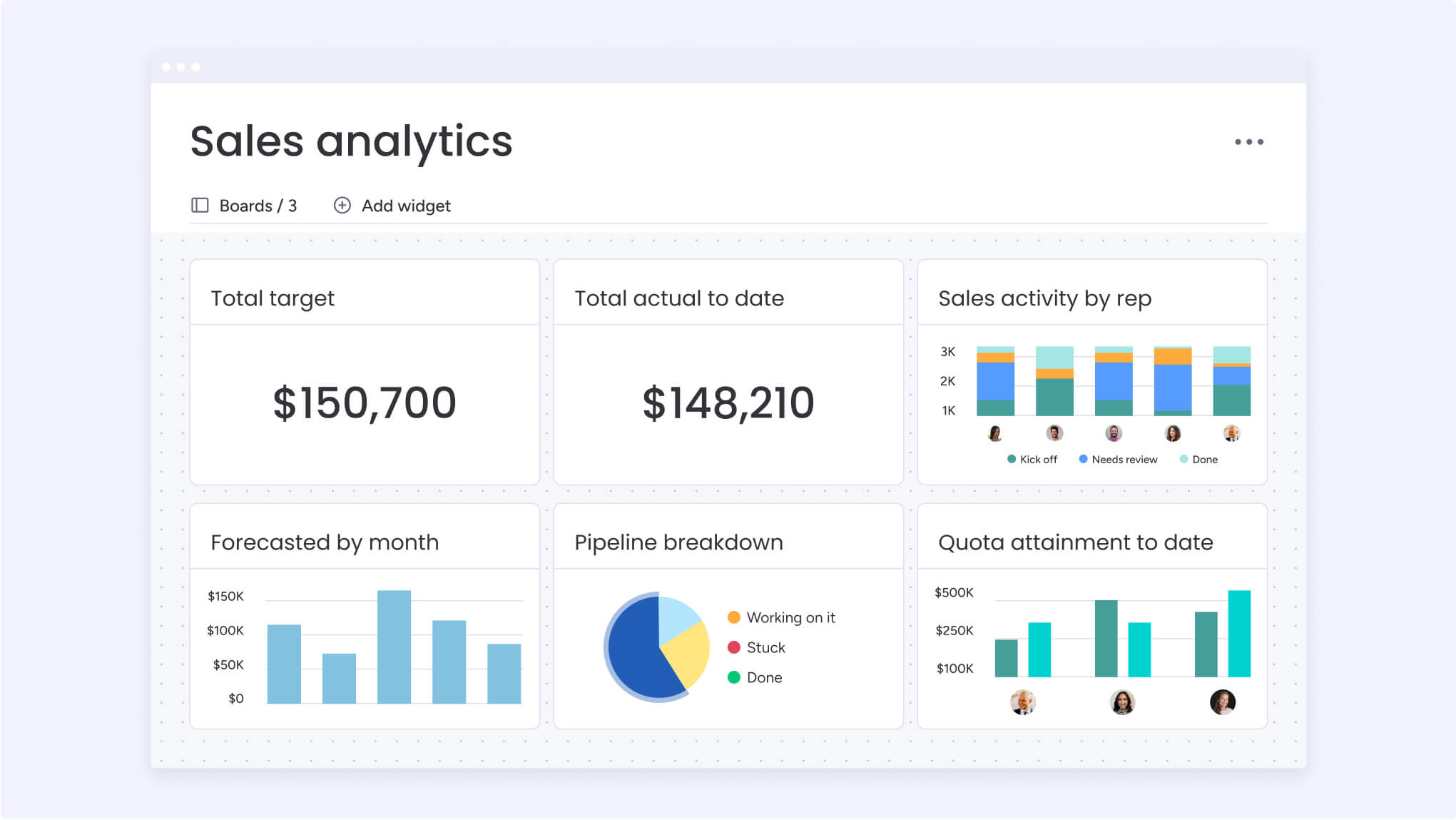
AI-powered reporting gives service managers instant visibility into job progress, technician workload, and overall service performance. Instead of reviewing long activity logs, teams can rely on AI-generated summaries to quickly understand customer history, recent interactions, and open requests. Predictive analytics help forecast demand and resource needs, enabling service leaders to plan staffing, schedules, and capacity proactively as job volume changes.
Intuitive interface that’s completely customizable
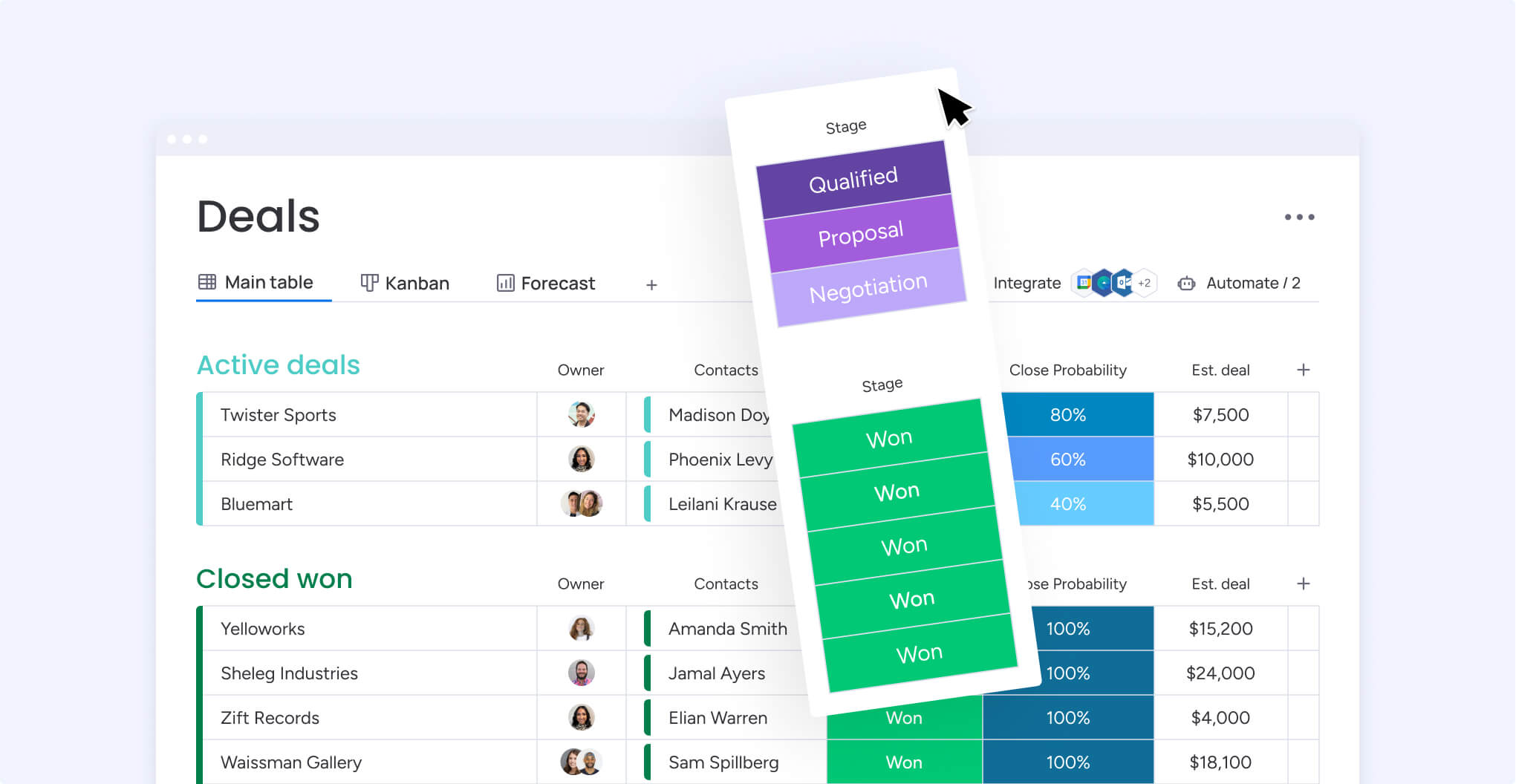
Designed to adapt to service workflows rather than force teams into rigid structures, monday CRM features a drag-and-drop interface. Teams can configure pipelines, dashboards, and automations without technical expertise in this simple CRM. Integrations with scheduling tools, accounting software, and communication apps keep service data connected across systems.
Custom intake and service request forms feed directly into job pipelines, ensuring the right information is captured upfront and work moves forward without unnecessary handoffs.
Real-world use case: Managing jobs and clients with monday CRM
EAG, a professional services firm serving the energy sector, faced a common challenge: client information scattered across spreadsheets, emails, and outdated platforms made it nearly impossible to leverage AI effectively. By rebuilding their CRM from scratch using monday CRM with only verified data, they created a clean foundation for intelligent automation.
As a result, EAG saved over 700 hours annually on prospecting emails, increased opportunity capture by 80%, and improved data quality by 95%. Additionally, automated lead enrichment at conference booths drove a 400% increase in qualified leads. With reliable data in monday CRM powering accurate forecasting and AI-driven insights, the team shifted focus from manual tasks to strategic growth and relationship building so that it could expand services and improve client satisfaction.
Future proof your service business with CRM AI and automation
The CRM you choose should support long-term growth by scaling with your service operations and automating work that would otherwise require additional headcount. AI-powered CRMs like monday CRM help service teams adapt to higher job volumes, evolving customer expectations, and more complex workflows—without sacrificing service quality or team efficiency.
Try monday CRMFAQs
What is the best CRM for service businesses to use in 2026?
One of the best solutions for service businesses is monday CRM. This solution stands out thanks to its flexibility with AI-powered automations, intuitive customization, and seamless integrations across your existing tools. The platform combines real-time insights, digital AI assistants, and smart workflows to improve productivity and customer satisfaction, all wrapped up in affordable pricing that allows teams to scale as needed.
How do pipeline stages differ for field service businesses compared to retail?
Field service pipelines focus on service delivery stages like appointment scheduling, technician dispatch, on-site completion, and follow-up maintenance. Retail pipelines emphasize product discovery, purchase decisions, checkout, and post-purchase support. Field service businesses need to track job assignments, equipment requirements, and scheduling logistics, while retail prioritizes inventory availability, promotions, and transaction processing.
What are the main benefits of using an AI-powered CRM for a small service business?
AI-powered CRMs can help small businesses by automating repetitive tasks like email summarization, lead enrichment, and follow-up scheduling, saving significant time. They provide predictive insights for customer churn and resource forecasting so that small teams can stay proactive. Additionally, AI assistants can generate content, detect sentiment, and surface important data automatically, allowing small teams to operate more efficiently and focus on delivering exceptional customer service.
How do automations in a CRM reduce administrative work for service providers?
CRM automations eliminate manual data entry by automatically capturing customer information, updating job statuses, and syncing communications across channels. They trigger follow-up emails, schedule reminders, and generate reports without human intervention. Tasks like lead assignment, invoice generation, and appointment confirmations happen instantly, allowing service providers to reclaim hundreds of hours annually and redirect energy toward revenue-generating activities.

